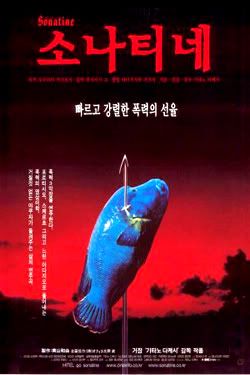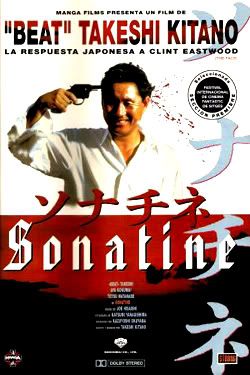← Back to Reviews
in
Plot – Murakawa (Kitano) is a world-weary Yakuza boss who seems tired of life. Dispatched to Okinawa to intervene in a Yakuza gang war, Murakawa and his men find themselves caught in the crossfire. Retreating to a safehouse on the beach they act like children by playing games and setting traps, while it slowly dawns on them that they have been set up as they are picked off one by one.
I have to say that I did enjoy this film even if I'm not entirely sure why, it just had something about it. I'm not generally a fan of gangster films, but then this isn't your standard gangster film. It's a much more unconventional, offbeat take on the genre. It's a lean, minimalist effort which is peppered with some deadpan, slapstick comedy and interrupted occasionally by a shocking burst of violence. It comes off like the antithesis of Bugsy Malone. In that film you had little kids acting like grown-up gangsters, while here we have real gangsters acting like little children. It gives an odd whimsical sense to it
Kitano's Murakawa is an enigmatically engaging presense, a great example of the anti-hero. Though he may not have the traditional looks you'd expect. Indeed he rather reminded me of Walter Matthau with his weathered face and tired, reserved manner. For the majority of the time he seems calm and apathetic about goings on but you always get the feeling of this vicious streak within him. It's a very strong performance. Oh and I also really enjoyed the two young gang members that are about, Ken and Ryoji I think it is. Instead of gangsters they act more like a couple of guys from a college frat house. Very entertaining. .
As you'd expect from a gangster movie there is a good deal of violence, and yet it doesn't feel particularly violent in a way. The violence is spaced out and is never really lingered upon or glorified. It occurs in short, sharp bursts which jolt the viewer out of the otherwise measured pace of the film, but then we have moved on. I also enjoyed the unusual final shootout. You're expecting this massive bloodbath, and yet we don't really see anything. And I mean we literally don't see anything. The conflict takes place in complete darkness, with only the eerie glow coming from each gunshot providing any light. And even then for much of it we find ourselves outside watching the flickering lights of violence bounce around and reflect off of cars.
Conclusion – A very intriguing film which certainly made me think. Quite often I'll watch a film that I really enjoy while it's on, but as soon as it's over you pretty much forget all about it. This was the rare example of the opposite. As it was going on I was enjoying it ok, but it was more when it was finished and I reflected on it that I began to appreciate it. 3.5 for now but it could certainly prove to be a grower.

|

|
Year of release
1993
1993
Directed by
Takeshi Kitano
Takeshi Kitano
Written by
Takeshi Kitano
Takeshi Kitano
Starring
Takeshi Kitano
Aya Kokumai
Tetsu Watanabe
Takeshi Kitano
Aya Kokumai
Tetsu Watanabe
Sonatine
+
Plot – Murakawa (Kitano) is a world-weary Yakuza boss who seems tired of life. Dispatched to Okinawa to intervene in a Yakuza gang war, Murakawa and his men find themselves caught in the crossfire. Retreating to a safehouse on the beach they act like children by playing games and setting traps, while it slowly dawns on them that they have been set up as they are picked off one by one.
I have to say that I did enjoy this film even if I'm not entirely sure why, it just had something about it. I'm not generally a fan of gangster films, but then this isn't your standard gangster film. It's a much more unconventional, offbeat take on the genre. It's a lean, minimalist effort which is peppered with some deadpan, slapstick comedy and interrupted occasionally by a shocking burst of violence. It comes off like the antithesis of Bugsy Malone. In that film you had little kids acting like grown-up gangsters, while here we have real gangsters acting like little children. It gives an odd whimsical sense to it
Kitano's Murakawa is an enigmatically engaging presense, a great example of the anti-hero. Though he may not have the traditional looks you'd expect. Indeed he rather reminded me of Walter Matthau with his weathered face and tired, reserved manner. For the majority of the time he seems calm and apathetic about goings on but you always get the feeling of this vicious streak within him. It's a very strong performance. Oh and I also really enjoyed the two young gang members that are about, Ken and Ryoji I think it is. Instead of gangsters they act more like a couple of guys from a college frat house. Very entertaining. .
As you'd expect from a gangster movie there is a good deal of violence, and yet it doesn't feel particularly violent in a way. The violence is spaced out and is never really lingered upon or glorified. It occurs in short, sharp bursts which jolt the viewer out of the otherwise measured pace of the film, but then we have moved on. I also enjoyed the unusual final shootout. You're expecting this massive bloodbath, and yet we don't really see anything. And I mean we literally don't see anything. The conflict takes place in complete darkness, with only the eerie glow coming from each gunshot providing any light. And even then for much of it we find ourselves outside watching the flickering lights of violence bounce around and reflect off of cars.
Much of the film takes place at a lovely, peaceful and isolated beach which is beautifully shot. The scenes at the beach were they play like children with frisbees and fireworks have so much life to them. It's quite touching to see these violent men returning to such a childhood-like state, a state of innocence and freedom. And yet there also seems to be an undercurrent tone of melancholic sadness. Though it becomes significantly more than an undercurrent during the game of Rock, Paper, Scissors which Murakawa turns into a chilling game of Russian Roulette. Taking a lot of time to relfect and showing the characters like this means we get the time to understand and even sympathise with these guys.
The film presents both a fairly standard gangster tale but more interestingly a character study of these violent men, and the second childhood of sorts they resort to. Oh and lastly I found the film to have a beautiful, somewhat haunting, and infectious score.
Conclusion – A very intriguing film which certainly made me think. Quite often I'll watch a film that I really enjoy while it's on, but as soon as it's over you pretty much forget all about it. This was the rare example of the opposite. As it was going on I was enjoying it ok, but it was more when it was finished and I reflected on it that I began to appreciate it. 3.5 for now but it could certainly prove to be a grower.
